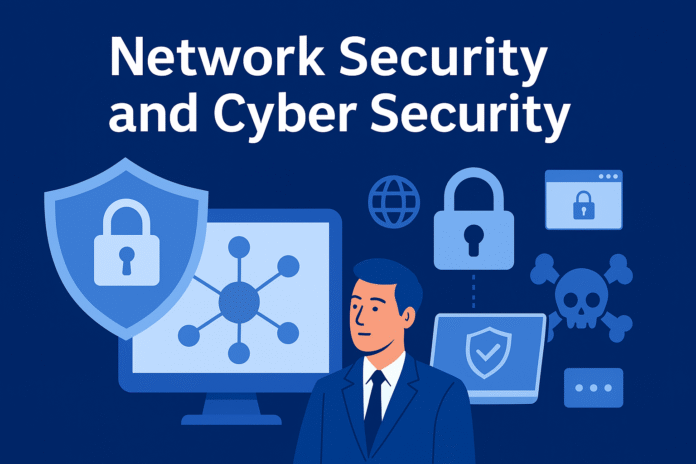In today’s digital world, network security and cyber security are two of the most important terms when it comes to protecting sensitive data and business systems. While many people use these terms interchangeably, they are not the same. Understanding the difference between network security and cyber security is essential for companies, IT professionals, and individuals who want to safeguard their information against cyber threats.
What is Network Security?
Network security refers to protecting the internal IT infrastructure, including routers, firewalls, switches, and servers, from unauthorized access, misuse, or attacks. It focuses on securing data in transit and ensuring only authorized users can access resources.
Key Functions of Network Security:
- Prevents unauthorized access to internal systems
- Uses firewalls, VPNs, and intrusion prevention systems
- Protects against malware and phishing inside the network
- Ensures data integrity and confidentiality
Example: A company protecting its office Wi-Fi from hackers using firewalls and strong encryption.
What is Cyber Security?
Cyber security is a broader concept that covers protecting data, devices, applications, and networks from all kinds of digital attacks. It goes beyond the internal network and focuses on overall digital protection against cyber criminals.
Key Functions of Cyber Security:
- Protects against external cyber threats like ransomware, phishing, and identity theft
- Secures cloud storage, websites, and mobile devices
- Includes application security, endpoint security, and data encryption
- Ensures compliance with data protection laws
Example: A business securing its e-commerce website from a DDoS attack or customer data breach.
Difference Between Network Security and Cyber Security
| Feature | Network Security | Cyber Security |
|---|---|---|
| Scope | Focused on protecting internal networks | Protects all digital assets (data, apps, devices) |
| Threats Addressed | Unauthorized access, malware, insider attacks | Ransomware, phishing, identity theft, data breaches |
| Tools Used | Firewalls, IDS/IPS, VPNs, access control | Encryption, MFA, antivirus, cloud security tools |
| Focus Area | Internal IT infrastructure | Overall digital ecosystem |
Why Both Are Important in 2025
In 2025, businesses face increasing cyber threats due to cloud adoption, remote work, and IoT devices. Relying on only one layer of protection is risky. Companies need network security for internal protection and cyber security for overall defense.
Key Benefits of Implementing Both:
- Protects sensitive customer and business data
- Reduces chances of financial losses from cyberattacks
- Builds customer trust and brand reputation
- Helps meet compliance and data protection regulations
Best Practices for Strong Security
- Use Firewalls & VPNs – for secure internal networking
- Multi-Factor Authentication (MFA) – to stop unauthorized logins
- Regular Software Updates – to patch vulnerabilities
- Data Encryption – for sensitive information storage and transfer
- Employee Training – to reduce phishing risks
- Cloud Security Solutions – for SaaS and cloud-based storage
Final Thoughts
While network security focuses on protecting your internal systems, cyber security covers the bigger picture of digital protection. Both are crucial for individuals and businesses in 2025 to safeguard data, prevent breaches, and stay compliant with regulations.
At Jazz Cyber Shield, we specialize in providing enterprise-grade security solutions, including firewalls, switches, and storage devices, to help businesses strengthen both network security and cyber security.



